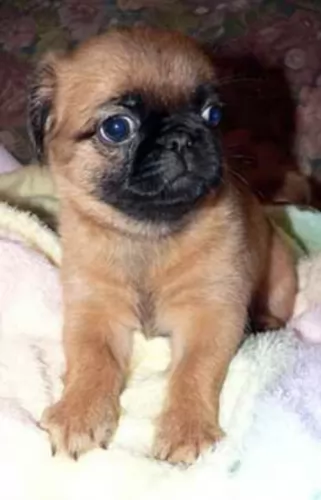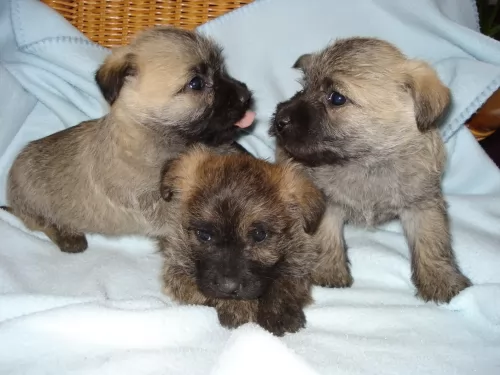 Petzlover
Petzlover Brug is originated from United States but Stabyhoun is originated from Denmark. Brug may grow 7 cm / 2 inches shorter than Stabyhoun. Brug may weigh 39 kg / 85 pounds lesser than Stabyhoun. Both Brug and Stabyhoun has same life span. Both Brug and Stabyhoun has almost same litter size. Brug requires High Maintenance. But Stabyhoun requires Low Maintenance
Brug is originated from United States but Stabyhoun is originated from Denmark. Brug may grow 7 cm / 2 inches shorter than Stabyhoun. Brug may weigh 39 kg / 85 pounds lesser than Stabyhoun. Both Brug and Stabyhoun has same life span. Both Brug and Stabyhoun has almost same litter size. Brug requires High Maintenance. But Stabyhoun requires Low Maintenance
 The Brug or Griffon Pug is not a purebred dog at this point in time. It is a cross between a Pug and a Brussels Griffon, currently known as a “designer dog” or a hybrid. This hybrid is really rare at this time but growing in popularity and breeders. Its exact history or original development is unknown at this time and needs to be researched as the hybrid develops into a breed, or breed clubs are formed. If you like either of the two breeds involved, you are sure to like the Brug. They are obviously not recognized by the major kennel clubs, but they are registered with a variety of hybrid/designer dog clubs. These include:
The Brug or Griffon Pug is not a purebred dog at this point in time. It is a cross between a Pug and a Brussels Griffon, currently known as a “designer dog” or a hybrid. This hybrid is really rare at this time but growing in popularity and breeders. Its exact history or original development is unknown at this time and needs to be researched as the hybrid develops into a breed, or breed clubs are formed. If you like either of the two breeds involved, you are sure to like the Brug. They are obviously not recognized by the major kennel clubs, but they are registered with a variety of hybrid/designer dog clubs. These include:
 The Stabyhoun is a near extinct breed and one of the rarest ever. He was never recognized by the major kennel clubs but was entered into Foundation Stock Services.. The breed comes from the Netherlands in the Frisian Forest and has been known since the early nineteenth century.
The Stabyhoun is a near extinct breed and one of the rarest ever. He was never recognized by the major kennel clubs but was entered into Foundation Stock Services.. The breed comes from the Netherlands in the Frisian Forest and has been known since the early nineteenth century.
It was not known outside of the Friesland Forest area until the 1960’s and outside the Netherlands only since the twenty first century. The Stabyhoun is a Dutch national treasure whose name means “stand by me dog”. Today throughout the world only a few thousand remain.
The Stabyhoun is hunter and retriever with a soft-mouth and ability to point. He was used for duck hunting and finding upland birds. He is great in the water, sharp-eyes and efficient, he works quickly. The breed has also been known to hunt fox, other birds and small game. They are great at catching moles.
Even though British breeds are more popular for hunting now, the Stabij remains an excellent all round hunter. He can track, point, and retrieve. He is also a good watchdog though his disposition is peaceful and gentle. They needed to be general all around farm dogs as farmers could only afford one dog.
They have not changed much since the 1800’s either in function or appearance. In order to get such a gentle working dog, they early Stabyhoun has been mixed with the much older and rarer breed from the same area, the Wetterhoun. This crossbreeding was stopped in 1942 in order to gain breed recognition and hope to keep either of these two rare breeds from extinction.
Today the number of Stabyhoun in the Netherlands, the United Kingdom, North America and Scandinavia are slowly but surely increasing. He is highly prized as an independent thinker and hunter, inquisitive and gentle. They are related to the Heidewachtel and the Drentsche Patrijshound.
The first Staby born in the U.S. was around 1994 and in 2017 there were thought to be over 7000 Stabyhouns in the world. They are much more popular now in Europe and North America.
 Like its two parental breeds, the Brug is a smaller sized dog – both parents are lab dogs and so is the Brug. Because they are hybrids, Brugs can be very different in appearance but most seem to have large eyes, squishy faces, black masks, fluffy hair, long black whiskers, short fluffy hair, flat ears and a fluffy tail. They could be in any of a number of colors including fawn, black, cream or apricot.
Like its two parental breeds, the Brug is a smaller sized dog – both parents are lab dogs and so is the Brug. Because they are hybrids, Brugs can be very different in appearance but most seem to have large eyes, squishy faces, black masks, fluffy hair, long black whiskers, short fluffy hair, flat ears and a fluffy tail. They could be in any of a number of colors including fawn, black, cream or apricot.
 The Staby are powerful soft-mouthed pointers who are not too fine or too robust with tightly fitting skin. Their chest, legs, collar and tail are feathered and make the dog look like a longhaired canine, but she really is not. The dog is longer than it is tall, and his head is longer than it is wide. Most of the breed are black and white but there are many brown and white, while the orange and white are very close to extinction.
The Staby are powerful soft-mouthed pointers who are not too fine or too robust with tightly fitting skin. Their chest, legs, collar and tail are feathered and make the dog look like a longhaired canine, but she really is not. The dog is longer than it is tall, and his head is longer than it is wide. Most of the breed are black and white but there are many brown and white, while the orange and white are very close to extinction.
They have a slightly domed skull and a slightly arched but strong neck. Their muzzle is broad and the bridge straight while the nose is well developed. With medium sized ears, set low on the head and having the bottom third of the ears covered with hair. The eyes are round, medium sized and level in the head
They have a long sleek coat with a slightly wavy croup. They are never curly. Its back is straight, tail long and loin powerful.
 This hybrid is a loyal little dog. They are an affectionate lap dog that wants to be with his humans all the time. They have a very pleasant disposition and do well with children and other dogs. They might be shy to begin with but will warm up to affection. However, they are willful and self-important at times. This is tempered by their great sense of humor and empathy to its peoples’ moods. Left alone too long, they will tend to bark excessively.
This hybrid is a loyal little dog. They are an affectionate lap dog that wants to be with his humans all the time. They have a very pleasant disposition and do well with children and other dogs. They might be shy to begin with but will warm up to affection. However, they are willful and self-important at times. This is tempered by their great sense of humor and empathy to its peoples’ moods. Left alone too long, they will tend to bark excessively.
 Usually the hybrid dog can have better health than either of the parents. This is true with the Brug as well, but there are also some issues they may inherit from the parents or face simply because of their size and complexion. These include:
Usually the hybrid dog can have better health than either of the parents. This is true with the Brug as well, but there are also some issues they may inherit from the parents or face simply because of their size and complexion. These include:
 Though an isolated, rare breed for so long, the Stabyhoun does have several known health issues including:
Though an isolated, rare breed for so long, the Stabyhoun does have several known health issues including:
• PDA or Patient Ductus Arteriosis – heart issue from 6 weeks on. Major vessel does not close. With surgery it can be corrected.
• Type 1 von Willebrand’s Disease (vWB) – a bleeding disorder in its mildest form. DNA testing is available not required.
• Cerebral dysfunction – rare compulsive behavior at 6 weeks. It is fatal at this point. DNA testing will be required.
 Don’t let this dog get overweight. Feed a high quality dry food intended for small or toy dogs. One fourth to one half of a cup per day in two separate meals is what is recommended.
Don’t let this dog get overweight. Feed a high quality dry food intended for small or toy dogs. One fourth to one half of a cup per day in two separate meals is what is recommended.
Patella Luxation or slipped knee caps – small dogs often have this issue. The patella is the knee cap and layman often called it a slipped knee cap, but it is also called slipped stifles. The femur, the tibia and the patella do not line up and this causes an abnormal gait or even lameness. Puppies are born with this, but it does not exhibit symptoms until years later. Arthritis is the most common result. Occasionally surgery is required.
Eye Issues – Cherry eye, a genetic disease, as well as irritation from air borne particles, allergies or scratches.
Skin Allergies – They can have skin allergies so watch for excessive licking or scratching.
Breathing Issues – Asthma and respiratory issues are common among small dogs with these types of faces.
Like their 2 breed parents, the Brug is a small but energetic hybrid. They need to play and run on a daily basis. Leash walks are good, but they need a yard or dog park as well. They are athletic little dogs and are good at tracking, obedience and agility. You cannot force them to do an activity but if its fun they will jump right in.
 1Feeding the puppy -They are prone to obesity. Do not overfeed. Watch calories. Feed a high quality dog food meant for active medium sized dogs in 3-4 meals per day.
1Feeding the puppy -They are prone to obesity. Do not overfeed. Watch calories. Feed a high quality dog food meant for active medium sized dogs in 3-4 meals per day.
2.Feeding the adult – Feed a high quality dog for medium sized dogs in 2-3 meals per day.
An active dog that needs exercise. They need mental stimulation as much or more than they need physical. Don’t skimp on either. They love agility, field trials, lure coursing, and scent training. They also love the triathlon, frisbee and endurance.